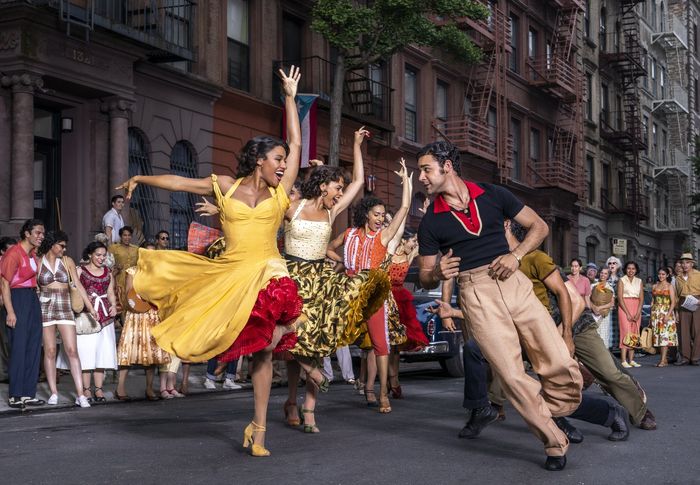LOS ANGELES—After a 111-minute family drama called “CODA” premiered at the Sundance Film Festival in January 2021, the usual phalanx of distributors began vying for the film.
According to a person involved in the negotiations, the iPhone maker saw something in the movie, about the hearing daughter of an all-deaf family, that few others did: an Oscar contender.
“Others saw it as comfort food, as opposed to a movie that’s on the awards circuit,” this person said.
Apple paid $25 million for distribution rights to “CODA”—a record for Sundance, but pocket change for a company with a $2.8 trillion valuation. Apple put the movie, which cost less than $10 million to produce, on its Apple TV+ streaming service and in a limited number of theaters for a brief run.
With 14 months’ hindsight, that check now appears to have been a down payment on an Oscar campaign that has upended the race for best picture and introduced a new tech giant as a serious Hollywood player.
“CODA,” which tells the story of Ruby ( Emilia Jones ), an aspiring singer living with an all-deaf family in a Massachusetts fishing village, is a front-runner for best picture at this Sunday’s Academy Awards. It is going head-to-head against not only old-guard studio fare like Steven Spielberg’s “West Side Story” remake and a new version of “Dune,” but also against movies from streaming-service rival Netflix Inc., which has poured millions into films designed to win awards, including this year’s “The Power of the Dog.”

The Oscar campaign for Steven Spielberg’s ‘West Side Story’ remake lost momentum after the musical returned middling box-office revenue.
Photo: Disney
Even as the Oscars face declining audiences, the awards have taken on outsize importance for streamers that want to prove that they deserve to be taken seriously in the movie business. In Apple’s case, the Academy Award recognition has bolstered awareness for Apple TV+, which vies for subscribers with Netflix and Walt Disney Co. Contending for major awards also helps convince producers that Apple TV+ is an appropriate home for high-profile films and TV shows.
Studios and their new tech rivals spend tens of millions of dollars each year wooing the Motion Picture Academy’s roughly 9,700 voting members with ads, events and other promotional efforts. The campaign season has grown longer than ever, beginning with fall film festivals and continuing through smaller awards that can pave the way toward an Academy Award.
One veteran awards consultant estimated Apple is spending more than $10 million on its “CODA” campaign.
“‘You find yourself with a short film made for $5,000 that is looking to campaign for $40,000.’”
The movie, which was seen as a “happy to be nominated” contender when the best-picture lineup was announced, started to surge late in the awards season. Apple hired a veteran awards-campaign firm to book screenings and meet-and-greets across Los Angeles, scheduling swanky venues like the high-end private club the San Vicente Bungalows with cast members like Marlee Matlin.
“CODA’s” surprise victory in the best-ensemble category at the Screen Actors Guild Awards in February put its Oscar campaign in hyperdrive.
“CODA” has now secured a solid footing in the best-picture race, thanks to victories in major categories at two awards ceremonies widely considered bellwethers for the Oscars: the British Academy of Film and Television Arts, or Baftas, where “CODA” won best adapted screenplay, and the Producers Guild of America, where the movie won outstanding producer of a theatrical motion picture.
When “CODA” cast member Troy Kotsur, who plays the father struggling to keep his fishing business, won the SAG award for best supporting actor, he thanked Apple for “believing in us deaf actors and casting us authentically as actors who happen to be deaf.”
“Hats off to Apple TV+,” he said from the stage.

One of Netflix’s Los Angeles billboards promoting its Oscar-nominated movies.
Photo: Barry King/Alamy
“CODA” is Apple’s first best-picture nominee. Netflix, by contrast, has spent mightily the past several years on best-picture campaigns but has yet to win the top prize.
The main competition to “CODA,” awards prognosticators and strategists say, is Netflix’s “The Power of the Dog,” a Jane Campion adaptation of a Western about a rancher and his brother’s family. Its 12 nominations cemented it as the movie to beat.
Among Netflix’s earlier best-picture attempts, Martin Scorsese’s “The Irishman” came close in 2020, as did Alfonso Cuarón’s “Roma” the year before. Resistance in some pockets of the Academy to awarding the industry’s top prize to a streaming company appears to have softened during the pandemic, which turned every studio into a de facto streamer during the many months theaters were closed.
Netflix is still seen as the awards-season heavyweight when it comes to flooding the zone with ads and events—more than one competitor called the company an “800-pound gorilla,” in part because it is campaigning with more nominations than any other studio.
Netflix’s clout at the Oscars is primarily orchestrated by veteran awards campaigner Lisa Taback, whose company the streaming giant acquired in 2018. Working for now-disgraced producer Harvey Weinstein in the 1990s, she helped craft campaigns for a string of best-picture winners, including “The English Patient” and “Shakespeare in Love,” and later on her own with “Spotlight.”
Ms. Taback’s awards team meets once a week to assess the state of the race, one former employee said, shifting resources toward contenders gaining momentum and away from those fading in the pack. On one short stretch of L.A.’s Sunset Blvd. earlier this month, Netflix had three “For Your Consideration” billboards in succession, for “Audible” (best documentary short), “The Lost Daughter” (best actress, Olivia Colman ) and “The Power of the Dog” (best supporting actress, Kirsten Dunst ).
The aggressive campaigning stands in contrast with the waning relevance of the Oscars in the broader culture. The awards show has seen steep ratings declines with each passing year, and while a nomination haul can boost a smaller movie’s profile, once-reliable box-office bumps from wins and nominations are a thing of the past.

L.A.-area Apple Stores remind shoppers that ‘CODA’ is up for the top prize at the Oscars.
Photo: Erich Schwartzel
Yet even as the Oscars see their place in the cultural conversation fade, the money being spent to win one of them appears to be reaching new heights. The Goliaths in the race have also fomented a sense in lower-profile categories, such as those for short films, that all-out campaigning is necessary, said Kim Magnusson, an Academy member who has been nominated as a producer seven times, primarily in the best live-action short category, and has won twice.
“You find yourself with a short film made for $5,000 that is looking to campaign for $40,000,” Mr. Magnusson said.
Apple easily spent that on one of its more unusual tactics: In February, the company rented out theaters across the country to show “CODA”—for free.
Some studio executives griped about the decision, since it allowed Apple to avoid reporting box-office grosses. A movie’s underperformance in ticket sales can slow its momentum on the trail, as evidenced by “West Side Story” this year, which was considered an early front-runner but fizzled when it made a subpar $38 million in the U.S. and Canada.
SHARE YOUR THOUGHTS
Do you think streaming services’ movies deserve Academy Award consideration? Why or why not? Join the conversation below.
During the free-screening weekend for “CODA,” the Coolidge Corner Theatre in Brookline, Mass., gave away 873 tickets. Several screenings were at capacity—an anomaly for such giveaways.
“Free tickets usually mean no-shows,” said Mark Anastasio, the theater’s director of special programming. “That was not happening for these screenings.”
But a cheaper strategy has emerged in Apple stores across Los Angeles, where the company has set iPads and computer monitors to the same lock screen: ads for “CODA,” reminding shoppers it is up for best picture.
Write to Erich Schwartzel at [email protected]
Copyright ©2022 Dow Jones & Company, Inc. All Rights Reserved. 87990cbe856818d5eddac44c7b1cdeb8








